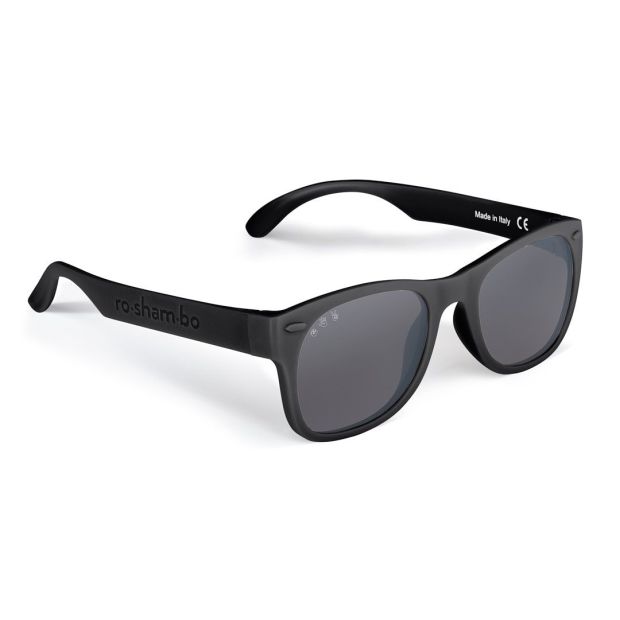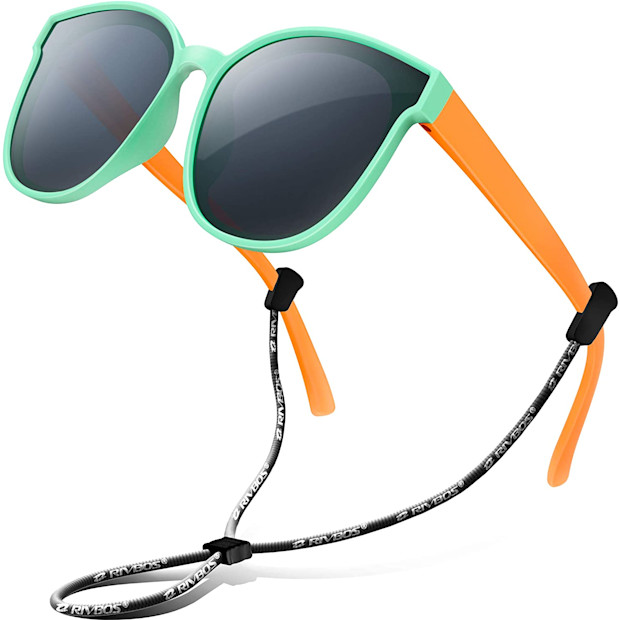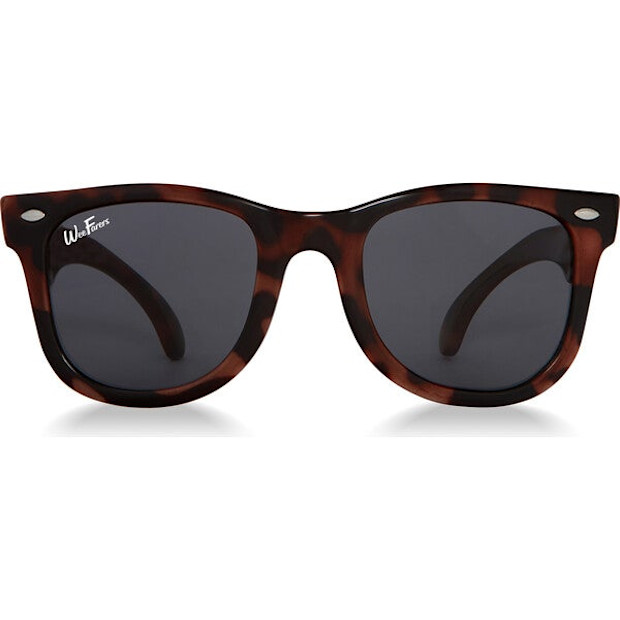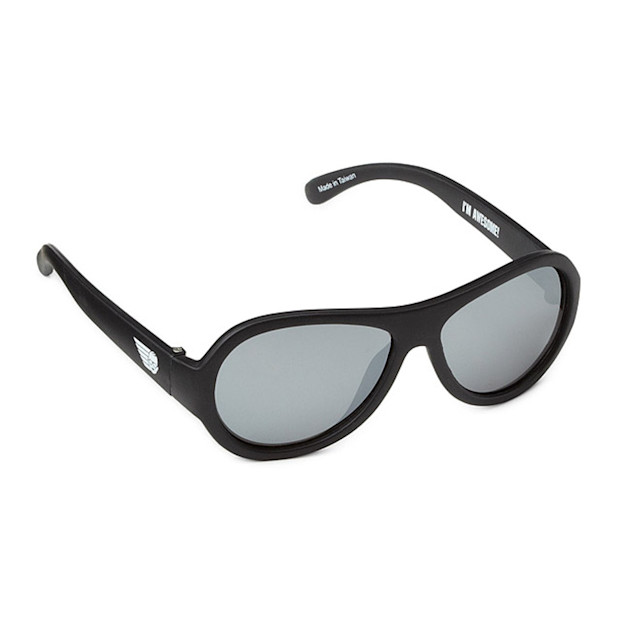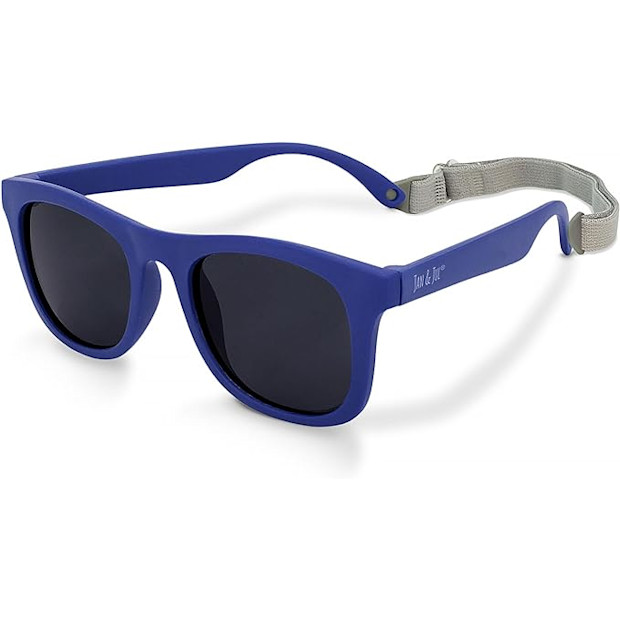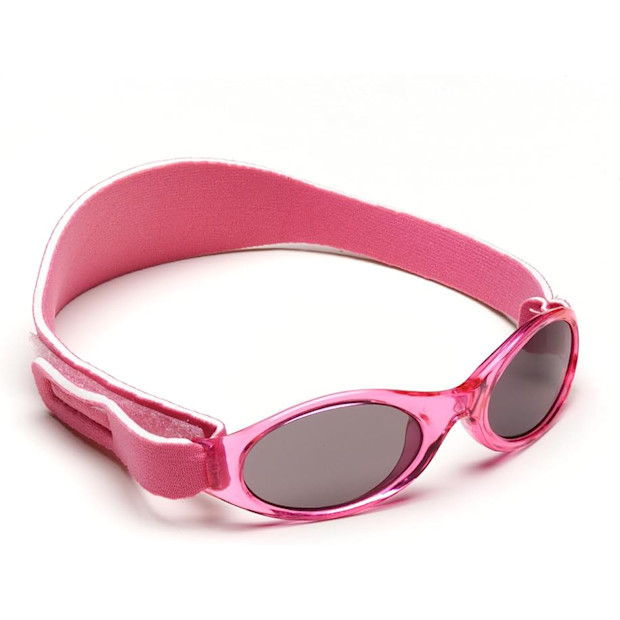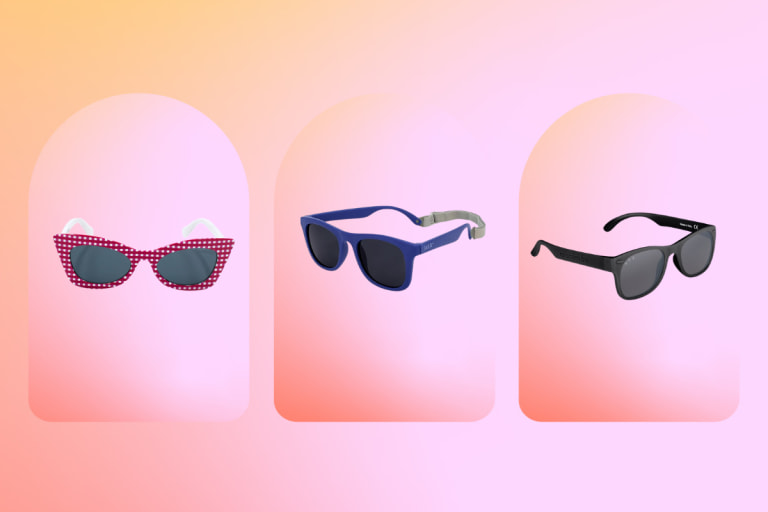
The Best Sunglasses for Babies and Toddlers That are Cute and Sun-Safe
These toddler and baby-proof sunnies will keep their eyes shaded and protected while they have fun in the sun.

In This Article
Sunglasses for babies are useful year-round. “Babies and toddlers should wear sunglasses when outdoors, especially during the summer months, and in winter, especially if they are in a snowy environment,” says Dr. Marie Bodack, Chief of the Pediatric Primary Care Service at the Southern College of Optometry and a professor. In addition to a brimmed sun hat for babies and toddlers and good-quality sunscreen, sunglasses for your baby or toddler can help to ensure that they’re enjoying their time in the sun safely.
When it comes to finding a pair of sunnies that’ll work for your baby or toddler, there are a few features to keep in mind, like the size range (most options are sized for newborn to 24 months and then up from there, and the style and fit (like if they are flexible versus rigid or have a strap to keep them in place). We’ve included a variety of style options and price points for you to choose from. Also, most of the options have polarized lenses for optimum eye protection and all of them will UVA and UVB blocking.
We’ve gathered some great, kid-friendly sunglasses that’ll safeguard your little one’s eyesight (and they’ll look pretty cool too). Note that all of the picks below are sized for 0 to 24 months (aside from one infant-specific option, which is labeled) so they’ll work for toddlers up to 2 years old. Some pairs are available in larger sizes, too.
Why Trust Babylist?
Babylist is the expert in baby; we know baby gear inside and out. We talk with parents face-to-face in our showroom and on our user panels and hear from thousands annually via our Best Baby Products online survey. We know what items millions of expecting parents are adding to their baby registries.
We utilized insight from the Babylist editorial team, including Commerce Editor and mom Latifah Miles and Gear Editor Jen LaBracio, an expert in the baby space for over six years and a mom of two who has written hundreds of baby gear guides and personally researched and tested hundreds of baby products, including toddler sunglasses.
We researched information on toddler eye safety and toddler sunglasses from the American Academy of Pediatrics (AAP) and the American Academy of Ophthalmology.
We interview Dr. Marie Bodack, Chief of the Pediatric Primary Care Service and a professor at Southern College of Optometry and Dr. Meenal Agarwal, an ophthalmologist.
We reviewed customer reviews from hundreds of real Babylist parents.
How We Judged the Best Sunglasses
Best Polarized Sunglasses
A polarized lens can help reduce eye strain while improving clarity, making it easier for your toddler to see through the shades. They’re a good choice for toddlers sensitive to bright lights or spending a lot of time in the sun. While polarization isn’t an absolute must-have in a pair of quality sunglasses for babies or toddlers (UVA/UVB protection is most important), it’s nice to have, especially on snowy, sunny days where light reflection is high.
Best Well-Priced Sunglasses
If you don’t want to spend more than a few dollars on a pair of toddler sunglasses, we get it—especially if you aren’t sure if your toddler will take to wearing sunnies right away (my daughter didn’t). These well-priced options will protect their eyes, are durable and fit into your budget.
Best Stylish Sunglasses
Adult-style sunglasses shrunk down to baby and toddler size are almost too cute to be real. From mature prints to aesthetic shapes, stylish sunnies will go with every outfit while protecting their eyes. One thing to note with some of the more stylish options is that they don’t typically come with a strap, so are better suited for toddlers versus young babies who won't be able to keep them on their faces.
Best Sunglasses with a Strap
Best for younger babies who might have a hard time wearing standard sunglasses, options that have a strap will comfortably stay in place. And If your toddler would prefer to do just about anything other than sit still, these will work for them too. Most of the time, the strap is adjustable and removable, so you can figure out the most comfortable fit or take it off completely if you choose to.
Do Babies and Toddlers Need Sunglasses?
Yes and no. Babies and toddlers can benefit from sunglasses as they protect their eyes from harmful ultraviolet (UV) rays, the type of light emitted from the sun. Children’s eyes are more transparent than adult eyes, and exposure to UV rays can cause long-term health effects on the eyes. The rays of the sun can damage the eyelid, cornea, lens and other parts of the eye, cause retina damage and can lead to eye diseases like cataracts or macular degeneration over time. According to the AAP, UV damage is cumulative over a lifetime, so it’s important to start early and protect your toddler’s still-developing eyes with sunglasses as much as possible.
Just like sunscreen, sunglasses aren’t just for the summer months, either. It’s just as important to protect their eyes in the winter when there’s snow on the ground as it is when they’re outside on a sunny summer day. That’s because snow reflects up to 80 percent of the sun’s rays—far greater than the reflection off of water, sand, cement, grass or dirt. This can cause sunburn of the eye (sometimes referred to as “snow blindness”), which is usually temporary but can be painful. Altitude also increases radiation, something to keep in mind if you’re heading to a winter destination like a ski resort at a high altitude.
But here’s where the no comes in—since we know that toddlers are likely to lose, break, or flat-out refuse to wear their sunglasses to protect their eyes, Dr. Bodack says “If the child does not tolerate glasses at all, a wide-brimmed hat would be the best option to protect the eyes.” You can continue to practice wearing sunglasses until they eventually give in (hopefully).
When Can Babies Wear Sunglasses?
Baby sunglasses come in sizes that can fit little ones as young as newborns, so if your new baby is going to spend some time outside, you should grab a pair. Keep in mind that infants under six months old should spend very limited time, if any at all, in direct sunlight.
What To Look For in Baby and Toddler Sunglasses
When shopping for sunglasses for your baby or toddler, the most important thing to look for is sunglasses that block or offer 99 percent and higher UVA and UVB radiation protection. These types of ultraviolet radiation can burn or damage eyes and skin, so it’s essential that the sunglasses you choose for your child protect their eyes from these harmful rays.
You’ll also want to prioritize safety and comfort; here’s what to keep an eye out for.
Baby sunglasses don’t have a consistent standardized sizing—it really depends on the brand. With that said, the sizing is categorized by age but if you’re still unsure about which size will work for your baby, take a peek at the brand’s sizing chart to get an idea. For newborns who will quickly outgrow glasses sized 0-3, you can opt for an adjustable strap style that’ll grow with them.
Choose sunglasses with shatter-resistant lenses. Toddlers especially are active and prone to accidents and injuries so durable, shatterproof lenses are a must.
Between babies and toddlers, their sunglasses are likely to be chewed, tossed, stomped on and otherwise handled roughly. With this in mind, prioritize frames made from flexible materials that can handle a beating.
Be sure the sunglasses you choose fit them properly. Look for sunglasses with adjustable straps or frames to ensure a comfortable fit and to help the glasses stay in place. According to the AAP, your toddler’s sunglasses should fit snugly, cover the entire area between the eyebrows and middle of the cheeks and wrap around toward their ears.
Style and design are also important factors to consider, as toddlers are more likely to wear sunglasses they find appealing and fun.
Types of Baby and Toddler Sunglasses
If you’re shopping for toddler sunglasses, you’ll find a few types and styles.
Polarized sunglasses have lenses designed to reduce glare and improve visual clarity. They work by blocking out horizontal light waves, which are the ones that create glare and reflections. These types of lenses can also reduce eyestrain, according to the American Academy of Ophthalmology. But does your toddler need them? According to Dr. Meenal Agarwal, ophthalmologist and host of the podcast Uncover Your Eyes, “your toddler may not necessarily need sunglasses with polarized lenses. However, they can be a good choice if your child is highly sensitive to light or frequently engages in outdoor activities, especially on the water or in snowy conditions.”
Non-polarized sunglasses don’t have the same light-filtering chemical applied to them that polarized sunglasses do. They’re also a good option for toddler sunglasses—just be sure they block 99 percent or more of UV rays.
If your child wears prescription lenses, you’ll want to talk with their eye doctor about prescription sunglasses. You may even want to look into photochromatic lenses that stay transparent indoors but darken when exposed to UV sunlight.
Style-wise, baby sunglasses are available in two basic styles, a strap style and a typical slide-on style. If your baby isn’t comfortable wearing typical sunglasses, Dr. Bodack says that “a strap can be worn to keep the sunglasses on the child’s face” so that they are less inclined to rip them off of their face. You can opt for either depending on what your baby is willing to tolerate.
For toddlers, their sunglass tend to have more shape and style options like wraparound sunglasses (maximum coverage and protection for your little one’s eyes and skin around the eyes), aviators (a classic look with larger lenses), wayfarers (trendy and retro) and sports sunglasses designed to stand up to active toddlers that feature a durable frame and scratch-resistant, breakproof lenses.

